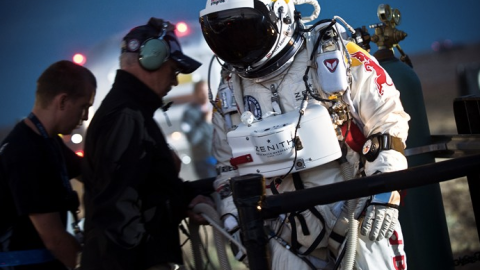The Man Who Jumps From Outer Space at Mach 1

Now that space exploration has been turned over to the private sector, we’re seeing a run of new space innovation that’s unequalled in history. Just two months after Elon Musk’s celebrated commercial spaceflight, space daredevil Felix Baumgartner jumped nearly 96,000 feet from the stratosphere, landing unharmed in the New Mexico Desert – the second-highest freefall jump ever by a human being. To put that into context – Mt. Everest is just over 29,000 feet tall; an F-22 jet has a maximum ceiling of 65,000 feet; and most weather balloons have a max altitude of 164,000 feet. The ultimate goal of Felix Baumgartner and his Red Bull Stratos team is an outlandish one: to become the first human to break the sound barrier in freefall with a jump from 120,000 feet later in the year.
What goes up must come down, and in this case, the terminal velocity of what comes down is over 120 mph. At his peak, Baumgartner was flying through the air at nearly 540 mph. (The speed of sound, or Mach 1, is 768 mph) Baumgartner’s flight down was nearly 18 miles, protected only by a space suit. It may sound obvious, but the human body is just not meant to withstand these flights of fancy at such reckless speeds for even limited periods of time. Your blood literally boils over, your eyeballs start to come out of their sockets, and your entire body becomes the equivalent of a flaming meteorite. Yet, breaking the speed of sound with the human body – once unthinkable – could become commonplace. And when that happens, watch out – it could change the space exploration game entirely.
A brave group of space enthusiasts have fused together two entirely discrete strands of human endeavor – Extreme Sports and Space Exploration – to create something entirely new and unexpected: high dives by astronauts from outer space that could eventually reach 328,000 feet above Earth. Think of “space jumping” as a combination of Evil Knievel with Buzz Aldrin. Popular Science first examined “The Future of Re-Entry” back in 2007, laying out the physics of what it takes to jump from unimaginable heights. Imagine pushing the envelope even higher — jumping not from the stratosphere, but from outer space. That’s 60 miles up. Right now, the record is 120,000 feet, held by U.S. Air Force captain Joseph Kittinger (who, not coincidentally, is part of the Red Bull Stratos team).
Space jump pioneers such as former NASA flight surgeon Jonathan Clark see the space suits developed for space “high dives” as a form of ultimate survival life vest in the case of damage to a space shuttle mid-flight. If the space shuttle got hit, an astronaut could jump out of the shuttle the same way a passenger on a cruise ship might jump into the ocean with an orange life vest. Just jump into the dark unknown and hope that technology will keep you alive. These were joined by the adventure daredevils and guys who liked to hang out on Harleys — they saw “space jumps” as the ultimate bungee jump – a kind of cheap excitement for tourists made possible by outer space. They didn’t care how you got up that high – all they cared about was the adrenaline rush of that 10-minute re-entry to planet Earth.
Now, it appears that both strands of space jumping are starting to fuse together: you’re getting the Red Bull thrill-seekers and the long-time NASA veterans developing world-class technology. That can only mean good things for the space program, which has been rejuvenated with a burst of innovation recently. You have Elon Musk’s SpaceX accomplishments. You have new excitement about missions to Mars. You have at least 10 versions of private spaceships being readied for future launch. And you have insane ideas – like a giant Google X space elevator – that are now entering the mainstream. Now that the government bureaucrats have turned over the space exploration game to the entrepreneurs and visionaries, we’re re-imagining impossible feats. Breaking the speed of sound while space diving from 120,000 feet above Earth? That’s just the beginning of a brave new era in space exploration, as humankind re-thinks its role in the cosmos.
image: Felix Baumgartner / Red Bull Stratos





